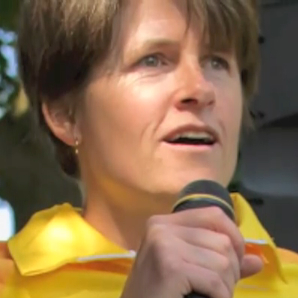Sally Clark, Seattle City Council, talks about urban agriculture at the Seattle Tilth Harvest Fair.
Here’s what Sally had to say:
I think you have a critical mass of people on the City Council if not all of the people on the City Council who are really thinking in almost all aspects of the work that we do in the city about sustainability. What it means to be a sustainable city.
Whether you’re talking about the water that we’re drinking, the water that’s coming out of our taps or the way we pave the road; the way we define our roadways. Part of that, the most obvious part that people think about is what we’re growing in the city. What they have access to, versus what they are buying in a grocery store. Sometimes those things meet up. Sometimes those things meet up through a farmers market or through a market that is buying from the greater Puget Sound area.
But for too many of our citizens those things don’t meet up. And what we are really committed to is to be sure that people have as much flexibility, as much choice about how they make those sustainable choices for themselves. And we get a lot of feedback that people would like to be able to have more creative choices in terms of how they grow their own food or how they’re buying food grown locally.
How that food can be guaranteed to be safe and sustainable. So it’s a whole cycle. Part of this is trying to stimulate a demand for those products. Part of it is giving all of us better flexibility so that we have access to a P-Patch or a parking strip.
Or if we don’t want to grow stuff – if we just don’t like getting our hands dirty – that there’s somebody around the corner who might be interested in it. Maybe we’re part of the demand that helps them plant a little bit more next time and if they can make a dollar off that, good.
Chickens, goats, all of that is part of it. Bees. Bees are definitely kind of the new goat. And the goats became the new potbelly pig.
It all changes over time and people test out what works for them. I’ve talked with two people recently who’ve said, “We tried ducks. We’ll never do ducks again! Oh my god, they’re messy! They’re mean! They trample everything!” Some of these things will work. Some of them won’t.
But over all, I think we’re all in agreement that organics works. We feel better about having fewer chemicals in our bodies and in our lives. We see that connected in so many things; whether it’s the study about learning disabilities; whether it is the raft of the theories about Alzheimer’s. There are a lot of different reasons for us to commit to this.

